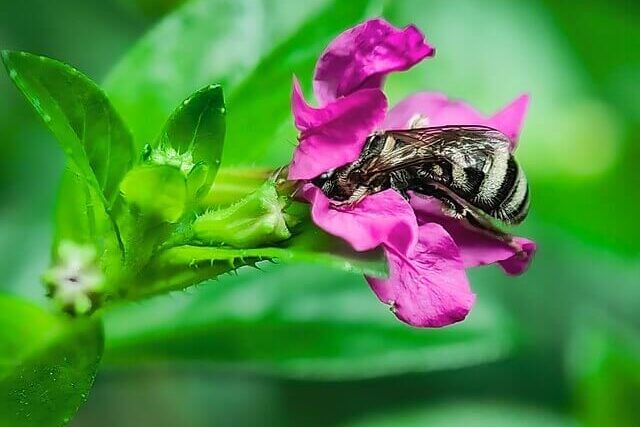
A recent report reveals that despite three decades of conservation efforts, insects on British farmland continue to decline.
The study, based on data from citizen science initiatives covering over 1,500 invertebrate species, shows that populations of bees, spiders, ground beetles, and hoverflies have disappeared twice as quickly in areas with intense crop farming.
While sustainable and wildlife-friendly farming practices have emerged since the 1990s, such as planting hedgerows, wildflowers, and stricter pesticide regulations, these measures have not effectively halted biodiversity loss.
“In fact, for most of the taxonomic groups included in this study, declines appear to have accelerated over recent years,” the researchers write in the paper Invertebrate Biodiversity Continues to Decline in Cropland, published in the journal Proceedings of the Royal Society B.
The research suggests that although local conservation efforts have shown some positive impacts, they have not been implemented on a large enough scale to have a national effect. However, scientists believe that changes to UK agricultural policy following Brexit could provide an opportunity to achieve conservation goals.
Lead researcher Francesca Mancini, from the UK Centre for Ecology and Hydrology, said: “The main message to policymakers is that despite the efforts we have put in in the last 30 years, this is just not enough. We really need to review what we’ve done and try to do better for the future for diversity, but also for the future of agriculture.”
Insects play a critical role in ecosystems as they serve as food sources for other creatures, pollinate crops, and contribute to nutrient recycling. T
he study compared areas in Britain with high and low cropland cover and found that declines in insect populations were more severe in areas with high cropland coverage. The researchers divided the country into 1 square kilometer cells and assessed the amount of cropland, primarily oilseed rape and cereals, within each cell. Grazed land was not included in the analysis.
The data revealed that in areas with over 50% cropland cover, invertebrate species had disappeared from 5% of sites that were occupied in 1990, while in areas with less than 50% cropland cover, they had disappeared from 2% of sites. Among the six taxonomic groups examined, spiders and bees were the most negatively affected in high-cropland areas, experiencing declines of 7% and 4%, respectively. The researchers suspect that the declines were even more severe before 1990 but lack sufficient data to confirm.
“They are pretty sizeable declines,” said Mancini. “Because of the introduction of environment schemes and the improvement of policy and practice since the 1990s, we were hoping that we would find a slowing down or trends becoming stable. But that’s not the case, and things are still declining.”
The report presents several possible factors contributing to the decline of insects, including the overall intensification of agriculture, changes in the type and effectiveness of insecticides, habitat loss around croplands, and the impact of the climate crisis and weather-related events such as drought.
These findings align with a recent study showing that intensive agriculture is the primary driver of bird declines in Europe. The study, based on data collected by thousands of citizen scientists across 28 countries over nearly 40 years, identified the use of pesticides and fertilizers as the major contributors to bird population declines.
The continued decline of insects and other wildlife underscores the need for more comprehensive and widespread implementation of wildlife-friendly farming practices. The findings of these studies emphasise the importance of sustainable agricultural policies that prioritise biodiversity conservation while ensuring food production.
By addressing the impacts of intensive farming, such as pesticide use and habitat loss, and scaling up wildlife-friendly measures, there is hope for reversing the current trends and safeguarding the invaluable role that insects play in our ecosystems.
“Sadly, insect declines are not surprising,” said Prof Jane Hill from the University of York, who is president of the Royal Entomological Society and was not involved in this research. “The findings help us to understand the patterns of insect declines, and so contribute to solving the puzzle of how to protect invertebrates and reverse declines.”
——————————————————————————
At Natural World Fund, we are passionate about stopping the decline in our wildlife.
The declines in our wildlife is shocking and frightening. Without much more support, many of the animals we know and love will continue in their declines towards extinction.
When you help to restore a patch of degraded land through rewilding to forests, meadows, or wetlands, you have a massive impact on the biodiversity at a local level. You give animals a home and food that they otherwise would not have had, and it has a positive snowball effect for the food chain.
We are convinced that this is much better for the UK than growing lots of fast-growing coniferous trees, solely to remove carbon, that don’t actually help our animals to thrive.
This is why we stand for restoring nature in the UK through responsible rewilding. For us, it is the right thing to do. Let’s do what’s right for nature!
Donate today at https://naturalworldfund.com/ and join in the solution!

